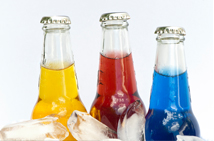NCD Watch
"Alcopops" are certainly NOT safer
6 Sep 2016 (Tue)
 Youth drinking is an important public health issue. The younger people start to drink, the greater the harm. Unlike adults, young people are more prone to the negative effects of alcohol physically, mentally and socially because of their still developing brain. Increasingly, alcoholic beverages are made to look and taste more appealing to the younger population.
Youth drinking is an important public health issue. The younger people start to drink, the greater the harm. Unlike adults, young people are more prone to the negative effects of alcohol physically, mentally and socially because of their still developing brain. Increasingly, alcoholic beverages are made to look and taste more appealing to the younger population.
1. What are "Alcopops"?
"Alcopops" are sweet-tasting, pre-mixed alcohol-based drinks which contain juice, other flavours or even caffeine. They usually contain similar amounts of alcohol as beer (about 4-7%) but can contain up to 8-12% of alcohol content, and sold in single colourful serving bottles or cans that resemble soft drinks. These drinks often use trendy names and can have different fruity flavors which appeal to younger people. All these tactics may make the consumers feel that the alcoholic drink is harmless, which is no more than a sugary flavoured beverage.
Not only does the ‘alcopops' outlook make the drinker less guarded, its fruity flavor can mask the alcohol taste and encourage the user to drink more, without noticing how much they have consumed. The result is the tendency to binge drink which in turn increases the risk of acute intoxication, self-inflicted harm, violence, injury and … lifelong regret.
2. What are caffeinated alcoholic beverages?
"Caffeinated Alcoholic Beverages (CABs)" are attracting much attention after being introduced into the market. In some countries, they target on the youth market by advertising with youth-oriented graphics and messaging. CABs are premixed beverages that combine alcohol, caffeine, and other stimulants. They may be malt-spirits-based or distilled-spirits-based. CABs contain 5-12% alcohol (can up to 3 times alcohol content in beer from the market).
3. What are the dangers of drinking alcohol containing added caffeine or mixing alcohol with energy drinks?
While the alcohol in CABs tends to make drinkers sleepy, the caffeine in them can mask sensory cues that people rely on to determine how intoxicated they are. The risky trap is that individuals drinking these beverages may consume more alcohol-and become more intoxicated-than they realise. In fact, the Food and Drug Administration (FDA) in the United States had raised serious concerns over alcoholic beverages with added caffeine.
On the other hand, energy drinks that contain ingredients such as caffeine, taurine, glucuronolactone and B vitamins, etc. should not be consumed along with other substances (e.g. alcohol or drugs) that affect the functioning of the central nervous system. Overseas studies have shown that, compared to drinkers without mixing alcohol with energy drinks, drinkers consuming alcohol mixed with energy drinks were 3 times more likely to binge drink. Binge drinking can increase risk of a series of immediate and long term harm including alcoholic poisoning, accidental injury, interpersonal violence, road traffic accidents, unsafe sex, alcohol abuse and alcohol dependence.
4. As a parent or guardian, what should I do to protect my child(ren) from alcohol-related harm?
Packaged as a sugary flavoured beverage that appeal to young people, "alcopops" are in fact putting them at risk of early drinking and even binge drinking. Not only is it health-wrecking, it also increases the risk of accidents, injuries and all forms of harm. While young people are inquisitive and love to explore the world, they need to be alerted so as to watch out for the marketing tactics.
Parents or guardians can influence their children's drinking behaviour by :
|